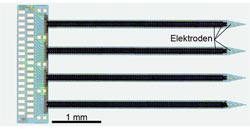New Probes for the Brain

Example of a neural probe with 752 microelectrodes distributed on four-millimeter-long shafts, like those developed in the project NeuroProbes: The scientists collaborating on the new research project NeuroSeeker want to build on this work./IMTEK<br>
Developing tiny probes for research and brain-related medical applications – that is the goal of the project NeuroSeeker, launched in February 2013 with a kick-off event in Leuven, Belgium.
The interdisciplinary project pools the expertise of ten partner institutions from Europe and Canada. The University of Freiburg will receive around 1.7 million euros from the European Union (EU) in the coming four years for its contribution. The project coordinator is Dr. Patrick Ruther, who works under Prof. Dr. Oliver Paul at the Microsystems Materials Laboratory of the University of Freiburg’s Department of Microsystems Engineering (IMTEK).
NeuroSeeker is an extension of the successful EU project NeuroProbes, which was completed at the end of the year 2010. The scientists are developing new probes for recording neural signals and stimulating optical tissue. In order to attain a fundamental understanding of the brain, it is essential to derive signals directly from its basic building blocks, the neurons.
The probes will thus be designed to measure and analyze the signals of individual nerve cells and their connections, and if necessary to optically or electrically stimulate nervous tissue. They will serve as instruments for basic neuroscientific research as well as for medical applications, for instance in the diagnosis of epilepsy. The partner institutions are the research center Imec in Leuven, Belgium; the University of Parma, Italy; the Dutch universities Amsterdam and Nijmegen; and the University of Lethbridge, Canada.
Other institutions contributing their expertise to the project are the Fundação Champalimaud from Portugal, the Max Planck Society from Germany, the Hungarian Academy of Science, and the joint IMTEK-Imec spin-off ATLAS Neuroengineering from Belgium. NeuroSeeker will support the new Cluster of Excellence BrainLinks-BrainTools of the University of Freiburg with its competence in neurotechnology and brain-machine interfaces.
Contact:
Dr. Patrick Ruther
Microsystems Materials Laboratory
Department of Microsystems Engineering – IMTEK
University of Freiburg
Phone: +49 (0)761 / 203-7197
E-Mail: ruther@imtek.de
Katrin Grötzinger
Communication & Marketing
Department of Microsystems Engineering – IMTEK
University of Freiburg
Phone: +49 (0)761 / 203-73242
E-Mail: katrin.groetzinger@imtek.uni-freiburg.de
Media Contact
More Information:
http://www.uni-freiburg.deAll latest news from the category: Information Technology
Here you can find a summary of innovations in the fields of information and data processing and up-to-date developments on IT equipment and hardware.
This area covers topics such as IT services, IT architectures, IT management and telecommunications.
Newest articles

Bringing bio-inspired robots to life
Nebraska researcher Eric Markvicka gets NSF CAREER Award to pursue manufacture of novel materials for soft robotics and stretchable electronics. Engineers are increasingly eager to develop robots that mimic the…

Bella moths use poison to attract mates
Scientists are closer to finding out how. Pyrrolizidine alkaloids are as bitter and toxic as they are hard to pronounce. They’re produced by several different types of plants and are…

AI tool creates ‘synthetic’ images of cells
…for enhanced microscopy analysis. Observing individual cells through microscopes can reveal a range of important cell biological phenomena that frequently play a role in human diseases, but the process of…





















